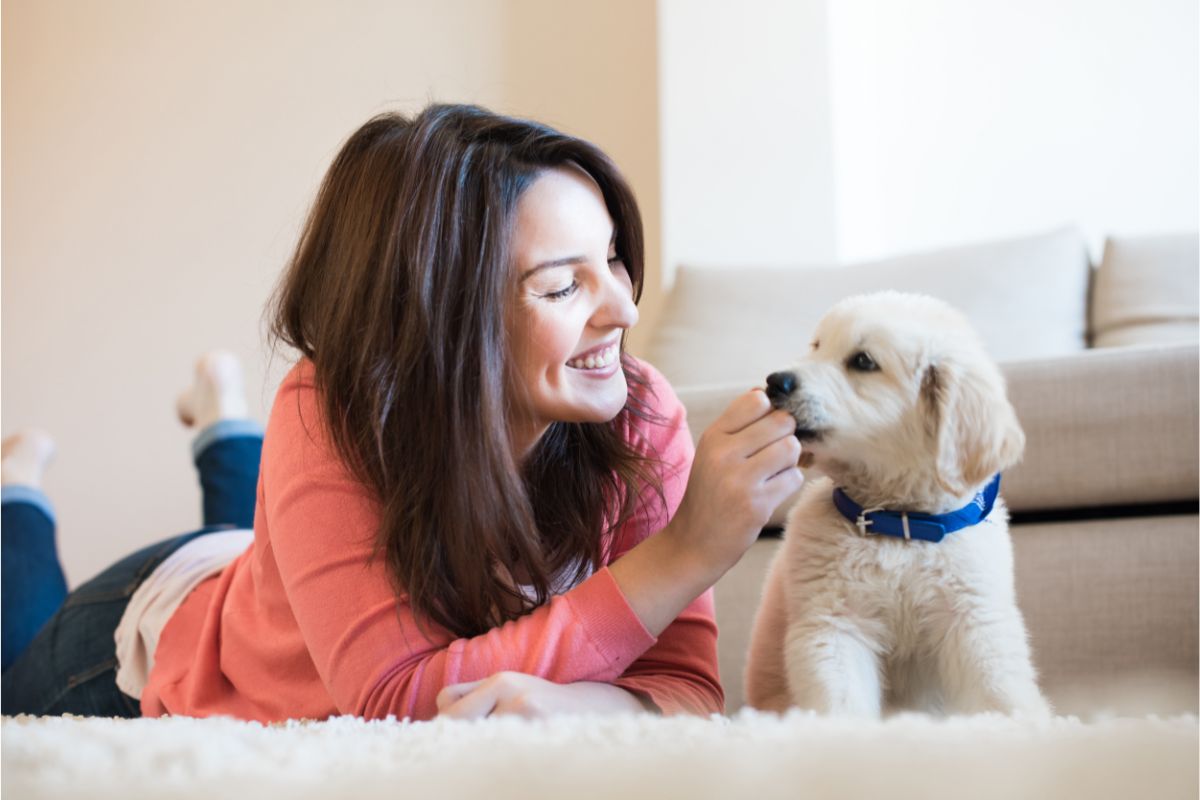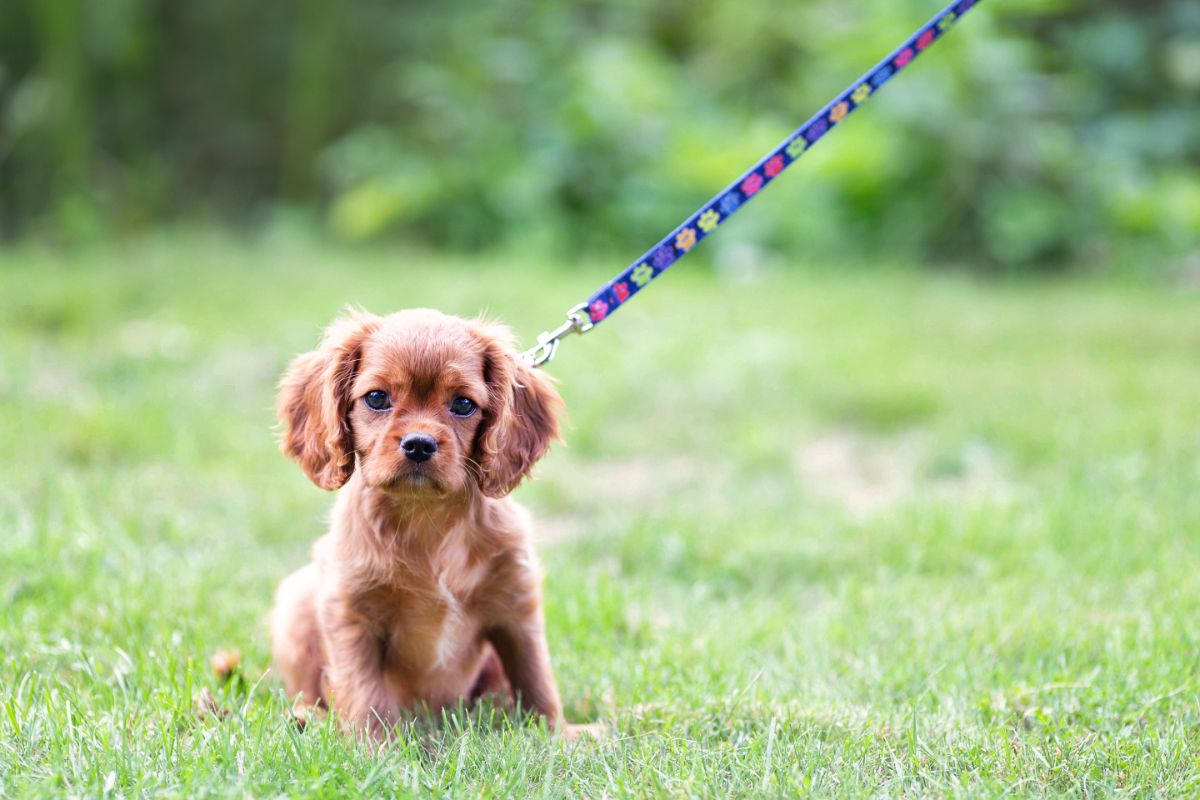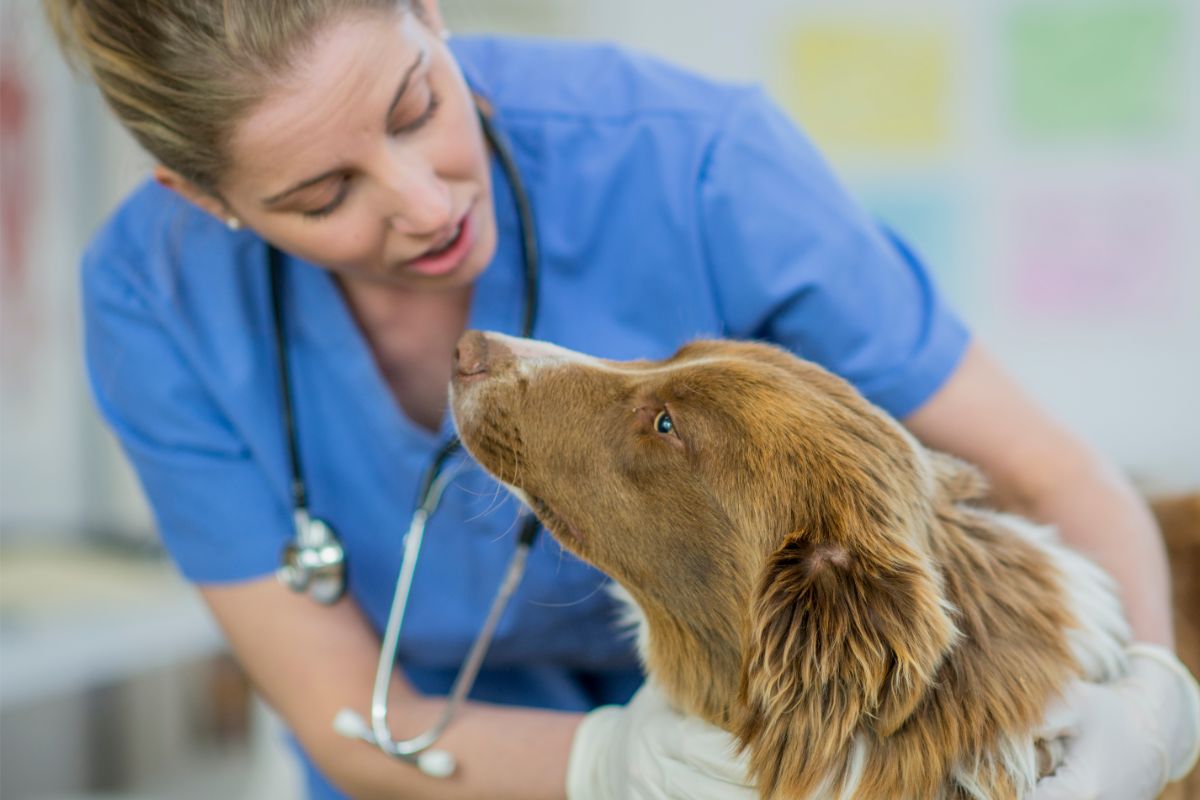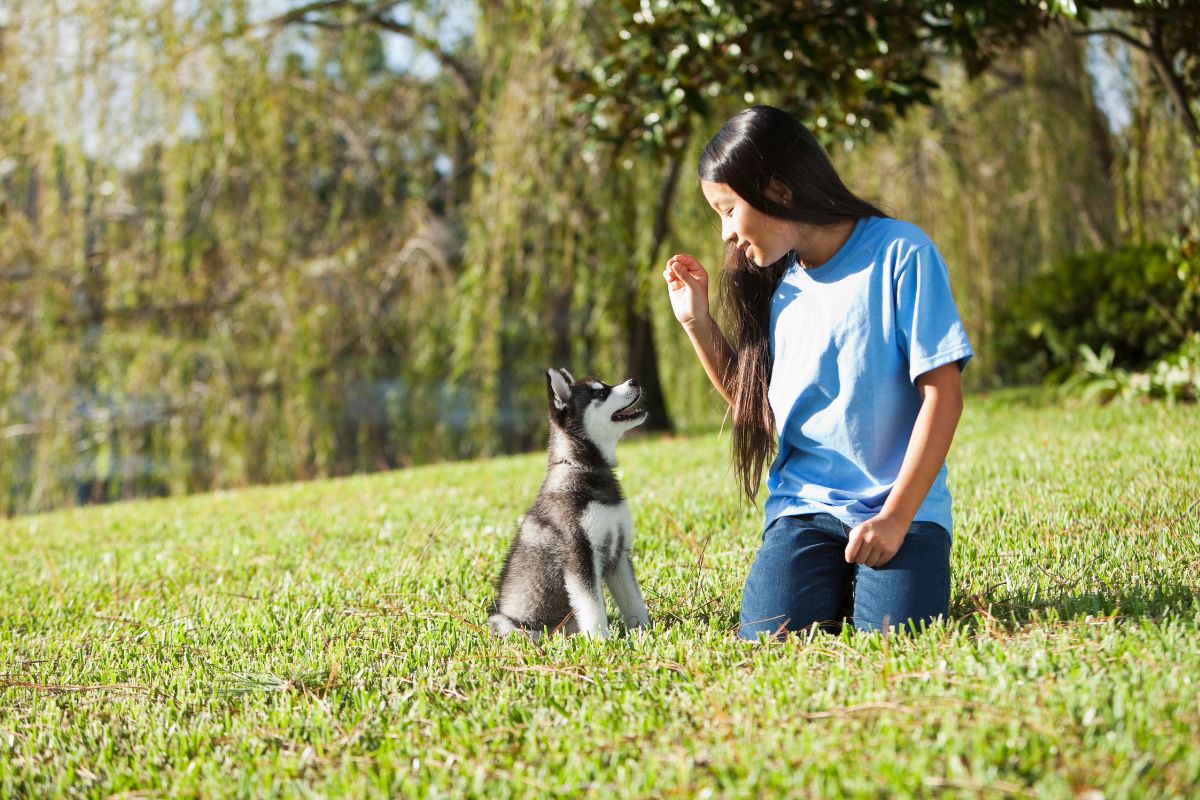If you’re looking for a furbaby to join your family, you can’t do much better than a golden retriever.
These pups are soft, cuddly, loveable, and funny. And, despite their docile appearance, they’re really smart.

If you’re looking to bring home your first golden retriever, it’s important to do plenty of research into the breed first to make sure it’s the right dog for you.
In this guide, we’ve got all the information you need on what the golden retriever is really like and how to take good care of this pup.
Breed Facts About Golden Retrievers
Let’s start with a bit of background on the beloved golden retriever.
This breed originated in Scotland in the 19th century. Retrievers were created by Sir Dudley Marjoribanks, who crossed tweed water spaniels, flat-coated retrievers, and other British breeds to create his first golden retriever.
Nowadays, the golden retriever is one of the most popular dog breeds in the world. In fact, it is estimated that there are more than 78 million golden retrievers across the globe.
These are muscular and strong medium to large-sized dogs with dense, fluffy coats. They have a long, straight muzzle and floppy ears.
And, of course, they have the classic puppy dog eyes – making them incredibly irresistible.
The golden retriever can now be found in shades of gold, cream, and red.
Golden Retriever Average Size, Lifespan And Key Life Stages
A golden retriever has an average lifespan of 10-12 years, but with the right care and a dog in good health, the lifespan can be longer.
Later in this guide, we’ll talk about some of the most common health problems that can impact your retriever’s lifespan.
Male golden retrievers grow to be around 65-75 pounds (29-34kg) in weight and 23-24 inches in height.
Females are usually a little smaller, at a weight of between 55 and 65 pounds (25-29kg) and a height of around 21.5-22.5 inches.
Most golden retrievers will reach their adult height by the time they’re around one year old, but many continue to grow up until the age of 18 months.
By this time, they should be completely filled out as an adult dog.
Let’s break their life stages down into a little more detail:
- Two Weeks: Golden retriever pups will start to open their eyes around two weeks after birth.
- Three Weeks: At three weeks old, the puppy will begin to walk (look out!)
- Four Weeks: At three to four weeks, the pup’s teeth will start to appear, and they can be slowly introduced to solid food.
- Six To Eight Weeks: The pup will be ready for the first round of vaccinations.
- Eight To Twelve Weeks: At eight to twelve weeks, pups will start to leave the litter and move in with their new owners – that’s you!
- Sixteen Weeks: By the time your pup reaches sixteen weeks, they should be sleeping through the night, and their milk teeth will be replaced by adult teeth. This should mean less teething and, therefore, less nibbling on things they shouldn’t!
- Six Months: By this time, your pup should be well-trained in the basics and moving on to more advanced training. At this stage, they will be just over halfway towards their full adult size. Many pups will be neutered between the ages of six and nine months old.
- One Year: By this milestone, your pup will likely have reached its full height – but it will still have some filling out to do.
- Eighteen Months: At eighteen months, your golden retriever is fully grown. Your pooch is officially an adult.
- Seven To Eight Years Old: When your golden retriever reaches around seven to eight years old, they will enter their senior years.
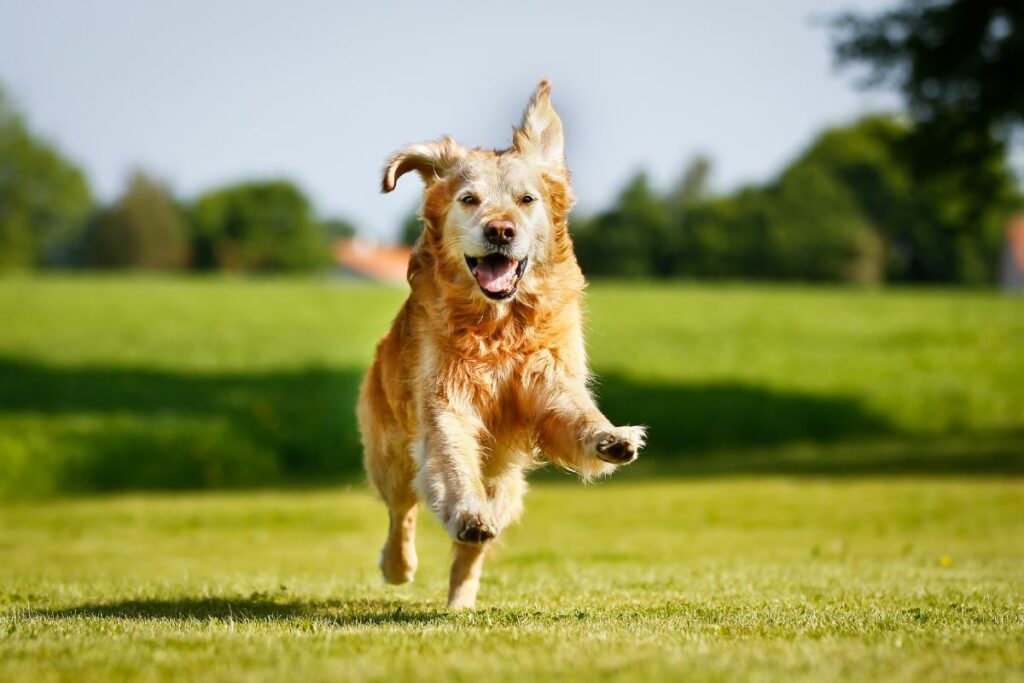
Golden Retriever Personality
The golden retriever’s personality is one of the main reasons this breed is loved the world over.
These dogs are playful, loving, and kind, and they work well in a family setting.
Golden retrievers are usually good with children, and they also mix well with other dogs and household pets – such as cats – as long as they are introduced properly.
Remember, they are gun dogs by nature, so be cautious when introducing smaller pets, and don’t leave them unsupervised.
Retrievers are smart and need a high level of mental stimulation, but they are also super eager to please their owners. All of this means they are fairly easy to train.
Golden retrievers are energetic dogs and so need plenty of exercise, but we will cover this a little more in the next section, where we look at how to care for them.
Their intelligence, eagerness to please, and gentle nature are also what make them perfect service dogs.
Caring For Your Golden Retriever
If you’re ready to bring home a golden retriever, it’s important to understand the care involved to keep your pooch in tip-top condition.
Diet
Your golden retriever will have different nutritional needs at different stages of their life.
As a puppy, your retriever will need more calories to help it grow, so it’s important to feed a specialized puppy diet.
They will also need more frequent meals, so splitting their daily food into three meals is usually recommended.
When they are fully grown, their calorific needs reduce, and it’s important to feed a well-balanced diet. Golden retrievers, like labradors, can be prone to weight gain, so it’s important not to overfeed them.
When choosing which food to feed your adult retriever, opt for a good quality dry food containing 18-22% protein and feed two meals per day.
You can also feed wet food, which can be beneficial for your dog’s hydration because of the higher water content, but we would recommend a diet that largely consists of dry as it’s better for their dental health.
To understand how much to feed, be sure to follow the instructions on the packaging for your dog’s size, age, and weight.
When a golden retriever reaches its senior years, it’s best to switch to a senior diet as this will contain glucosamine to help your dog’s joints, as well as the right balance of vitamins and minerals for an older dog.
You can supplement your dog’s diet with treats, but this should make up no more than 10% of their overall diet.
Some golden retrievers can suffer from a sensitive stomach, so be mindful to introduce new foods slowly and be careful when feeding human food.
For more information on what human foods your dog can or can’t enjoy, take a look at our guide.
Grooming
With such a luscious coat, your golden retriever will need a hand in the grooming department.
Unlike some other long-haired breeds, your retriever probably won’t need a full cut, but its coat will need the occasional trim.
It’s essential to start a grooming routine while your dog is young. Teaching them to be comfortable with grooming as a puppy can save a lot of hassle later on.
Golden retrievers are double-coated dogs, so using a slicker brush when your pooch is an adult is usually best.
As pups, though, their coat will still be developing, so choose a soft-bristled brush as you get them used to grooming.
Regularly grooming your retriever will keep its coat in excellent condition by removing dead skin cells and releasing the coat’s natural oils. It will also help with the amount they shed (as retrievers are big shedders).
Brush your golden retriever every few days, if possible, or at least once a week.
As part of your grooming routine, it’s advised to introduce some dental care – again, it’s best to start this off when your pup is young.
To avoid dental issues and gum disease, aim to brush your dog’s teeth a few times a week (or daily if you can). Tying it into your brushing schedule can be helpful.
Worming And Flea Treatments
Puppies require more regular worming treatments, but it’s important to continue to treat your dog for fleas and worms as they grow older.
As an adult dog, your golden retriever should be treated for fleas every month and worms every two to three months (more frequently if they have hunting tendencies).
Exercise
Golden retrievers are lively dogs and as such, they need a good amount of exercise.
As an adult, this breed needs one to two hours of exercise every day. It can be helpful to split this into two 45-minute to one-hour walks daily.
When at home, make sure your dog has plenty to play with – and engage in play with your retriever, too.
This will help with their exercise needs and will also keep them mentally stimulated, which can help stop them from destroying things around the house.
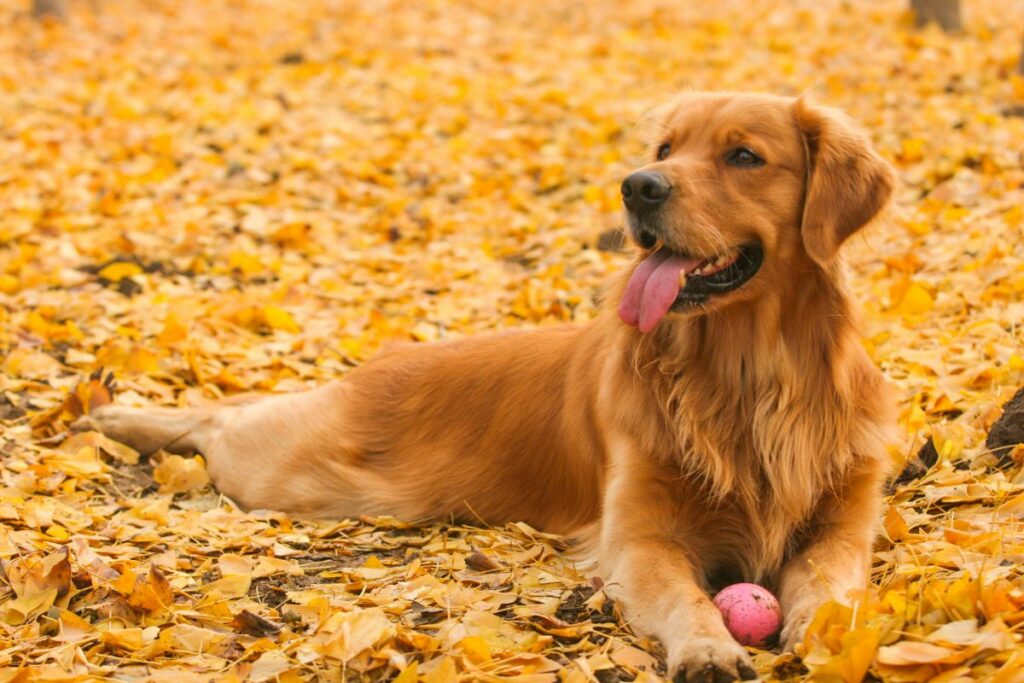
Common Golden Retriever Health Problems
Every dog breed has health issues that it’s more prone to. For golden retrievers, the following health problems are most common:
Eye And Ear Issues
- Cataracts: You’ve probably seen plenty of elderly retrievers with cloudy eyes. This is because cataracts are common for golden retrievers, particularly those in their senior years.
- Progressive Retinal Atrophy (PRA): This condition results in blindness and is caused by slow degeneration of the retinas.
- Glaucoma: This is a build-up of pressure in the eyes, which can cause pain and can lead to sight loss.
- Ear Infections: As a breed with floppy ears, golden retrievers are prone to ear infections.
Skin And Joint Issues
- Ichthyosis: This health condition, which is thought to have genetic links, presents itself with the thickening and flaking of the skin. It can lead to a dandruffy coat and also thickened footpads, which can be painful.
- Hip And Elbow Dysplasia: This is another common genetic health problem for the breed. This condition arises when the joints don’t sit together properly. As your dog ages, it can result in pain and stiffness, lameness, and even arthritis. When buying a golden retriever pup, ask if they’ve been screened for hip and elbow dysplasia – the breeder should be able to show you the certification from the test.
Other Issues
- Cancer: Golden retrievers are, unfortunately, prone to cancerous diseases such as lymphoma, osteosarcoma, hemangiosarcoma, and mast cell tumors.
- Hypothyroidism: This is most common between the ages of 4 and 10 and is a condition where the thyroid doesn’t produce enough hormones to control the metabolism properly. This can result in hair loss, weight gain, blackened skin, and lethargy.
Advice For Choosing A Golden Retriever Puppy
If you’re sold on getting a golden retriever, then adopting one is a fantastic option. Visit your local shelter to see if they have any retrievers, and try to find out as much as you can about the dog’s background.
However, if you’re looking for a puppy instead, it’s important to choose a reputable breeder and to be aware of the following:
- Check visual health signs: The puppy should be alert, with bright eyes and a clean nose. There should be no fleas, sores, or scabs, and the fur should be soft and clean. The ears should be clear with no signs of redness.
- Ask to see the mother: If possible, you want to see the puppy’s parents, but if it’s not possible to see both, you want to at least meet the mother. If the mother has a good temperament, the puppies are more likely to have good temperaments when they’re grown.
- Make sure the pup is vaccinated: By the time you’re ready to take your puppy home, the breeder should have taken them for their first vaccination, and they should also have had a full health check.
- Watch how the puppy interacts: Seeing the puppy interact with the mother, their litter mates, as well as the breeder can give you a good indication of the puppy’s personality and whether it’s a good fit for your family.
- Ask lots of questions: Ask about the flea and worm schedule, what the puppy is being fed, and whether the parents have been screened for hip and elbow dysplasia. Find out if any training has begun – for example, have the breeders started to toilet train the litter? Ask as many questions as you can.
When you bring your golden retriever pup home, the hard work begins. Take a look at our advice guides to get clued up:
In Summary
Golden retrievers make wonderful family pets, but as with any dog, it’s important to understand as much as possible about them before you make a lifetime commitment.
In this guide, we’ve talked about this breed’s personality and health problems, and we’ve shared advice on how best to care for them.
We hope you’re fuelled with knowledge ready to bring home your bundle of fluff.
- A Pawprint Pets Guide To Puppy Breeds – Golden Retrievers - August 10, 2023
- Ding Ding – How To Teach Your Dog To Ring A Bell To Go Outside - August 7, 2023
- Keeping Your Pooch Safe: A Comprehensive Guide On What’s Poisonous To Dogs - August 1, 2023




